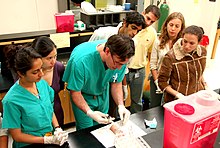Education and legal controls

Medical education and training varies around the world. It typically involves entry level education at a university medical school, followed by a period of supervised practice or internship, or residency. This can be followed by postgraduate vocational training. A variety of teaching methods have been employed in medical education, still itself a focus of active research. In Canada and the United States of America, a Doctor of Medicine degree, often abbreviated M.D., or a Doctor of Osteopathic Medicine degree, often abbreviated as D.O. and unique to the United States, must be completed in and delivered from a recognized university.
Since knowledge, techniques, and medical technology continue to evolve at a rapid rate, many regulatory authorities require continuing medical education. Medical practitioners upgrade their knowledge in various ways, including medical journals, seminars, conferences, and online programs. A database of objectives covering medical knowledge, as suggested by national societies across the United States, can be searched at http://data.medobjectives.marian.edu/.
In most countries, it is a legal requirement for a medical doctor to be licensed or registered. In general, this entails a medical degree from a university and accreditation by a medical board or an equivalent national organization, which may ask the applicant to pass exams. This restricts the considerable legal authority of the medical profession to physicians that are trained and qualified by national standards. It is also intended as an assurance to patients and as a safeguard against charlatans that practice inadequate medicine for personal gain. While the laws generally require medical doctors to be trained in "evidence based", Western, or Hippocratic Medicine, they are not intended to discourage different paradigms of health.
In the European Union, the profession of doctor of medicine is regulated. A profession is said to be regulated when access and exercise is subject to the possession of a specific professional qualification. The regulated professions database contains a list of regulated professions for doctor of medicine in the EU member states, EEA countries and Switzerland. This list is covered by the Directive 2005/36/EC.
Doctors who are negligent or intentionally harmful in their care of patients can face charges of medical malpractice and be subject to civil, criminal, or professional sanctions.
Comments
Post a Comment